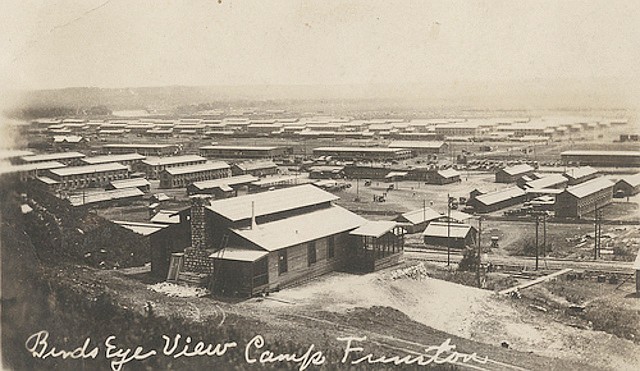A 21-year-old Frank J. Schulte, who grew up in the small Gasconade County community of Bay, was following the path of his father and many young men of the area in the year 1917 while trying to eke out a living as a farm laborer and hoping to someday purchase a farm of his own. In May 1917, as the nation was drawn into World War I, the direction of his circumstances were soon altered, however, by the newly implemented Selective Service Act.
On June 5, 1917, all males 21-30 years of age were required to register at their local voting precinct. Schulte's registration card indicates that although he was working as a farm laborer in Arlington, Nebraska, he made the trip home for the registration, requesting exemption from military service since he provided support to his father.
According to the Library of Congress, local draft boards were created in "each county that were to consist of three or more members who were to determine all questions of exemption in their jurisdiction." Although exemptions were available to "persons in certain classes or industries, including workmen in armories and those in agriculture," Schulte was denied an exemption.
"There were three drawings of numbers to determine the order in which men were to be examined by the local draft boards and evaluated for induction," wrote John J. Newman in his book "Uncle We Are Ready!" He added, "The first occurred 20 July 1917, when 10,500 numbers were drawn in Washington."
Schulte's draft order number was drawn during the initial lottery and, according to his service card maintained by the Missouri State Archives, he was inducted into the U.S. Army on Oct. 4, 1917, approximately one month prior to his 22nd birthday.
"My father never had much to relate about his service," recalled Harold Schulte, one of the WWI veteran's sons. "I do know that after he was drafted, he was sent to Camp Funston, Kansas, for his training."
Located on the Ft. Riley military reservation near Junction City, Kansas, the Kansas Historical Society notes Camp Funston was "the largest of 16 divisional catonement training camps built during World War I to house and train soldiers for military duty." Additionally, the society explained, it's "main purpose was to train soldiers drafted in Midwestern states to fight overseas."
One of the greatest challenges facing Schulte and his fellow soldiers at the stateside camp was not necessarily a grueling training regimen; instead, they endured the influenza pandemic that was coined the "Spanish Flu," which is believed to have originated at Camp Funston during the war.
Military records indicate the young draftee was assigned to an organization known as the 164th Depot Brigade, which the Topeka State Journal described in their October 13, 1917 edition as "made up of companies on about the same basis as infantry, is put thru the same setting up exercises, the same vaccination for smallpox."
The July 29, 1918, edition of the Morning Chronicle (Manhattan, Kansas) shared a more critical definition for the depot brigades, humorously noting they were referred to as "deposed brigades" by soldiers and used "merely as a storage place for soldiers in training (that) fails to impart the spirit, which is now springing up, of belonging to a regular organization."
The men in these brigades received their basic training and were often trained in specific specialties prior to being transferred as replacements in other units that were understrength. Such a training structure often inhibited cohesion among the troops since they were thrust into situations in which they had to serve with those with whom they had not trained.
"My father remained at Camp Funston and went on to train as a military policeman," said Harold Schulte, while discussing his late father's service. "He was then sent with a group to Camp Kilmer (New Jersey) for shipment overseas," he added.
The veteran's son further explained that while at Camp Kilmer, a number of soldiers with his father were struck with measles and the entire group was quarantined for several weeks. While waiting for the virus to clear up and an official release from medical staff, World War I came to an end and the soldiers were soon discharged.
In the years following his military service, the veteran settled in the community of Bay, married, raised a family and fulfilled the dream of running his own farm. A charter member of the Bay American Legion Post 541, of which several of his sons became members through their own military service, Schulte passed away in 1983 and was laid to rest in Zion Cemetery in his hometown.
Estimates indicate 2.8 million men were drafted into service during World War I and Schulte, who was among the many training for the eventuality of service in a deadly combat zone, never saw combat because of the country's brief period of involvement in the war.
"My father never spoke much about his service because he never made it overseas," Harold Schulte said. "But his service did seem to be full of interesting circumstances - being drafted, training for war and never making it overseas because of illness among his fellow troops."
Schulte became part of an Army that grew from 127,000 in 1916 to more than 4 million in 1918. He may not have engaged it the scenes of trench warfare that have become the highlight of WWI historical reference but, as Gen. John J. Pershing wrote in a letter to his fellow Missourian, Maj. Gen. Enoch Crowder, in October 1917, each individual was to accomplish the tasks they were assigned.
"I have the burning desire to get right into the trenches and go over the top, but I can't do that," Pershing wrote. "And so each man to (perform) the job that has been given him."
Jeremy P. Amick writes on behalf of the Silver Star Families of America.

